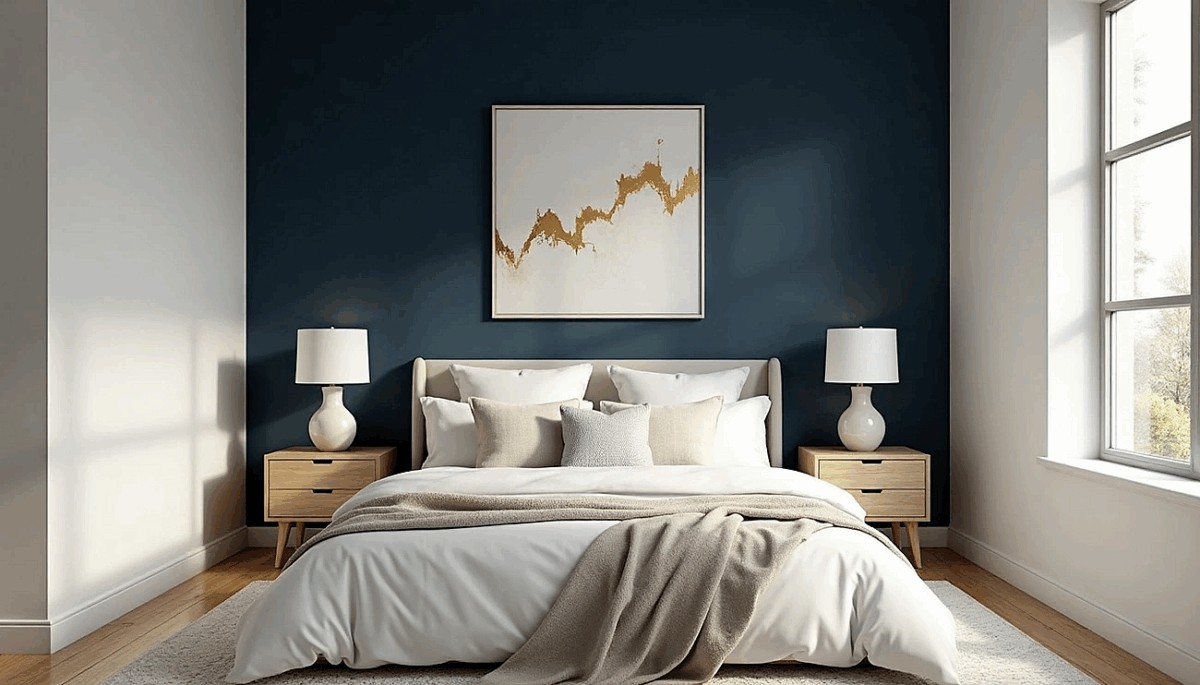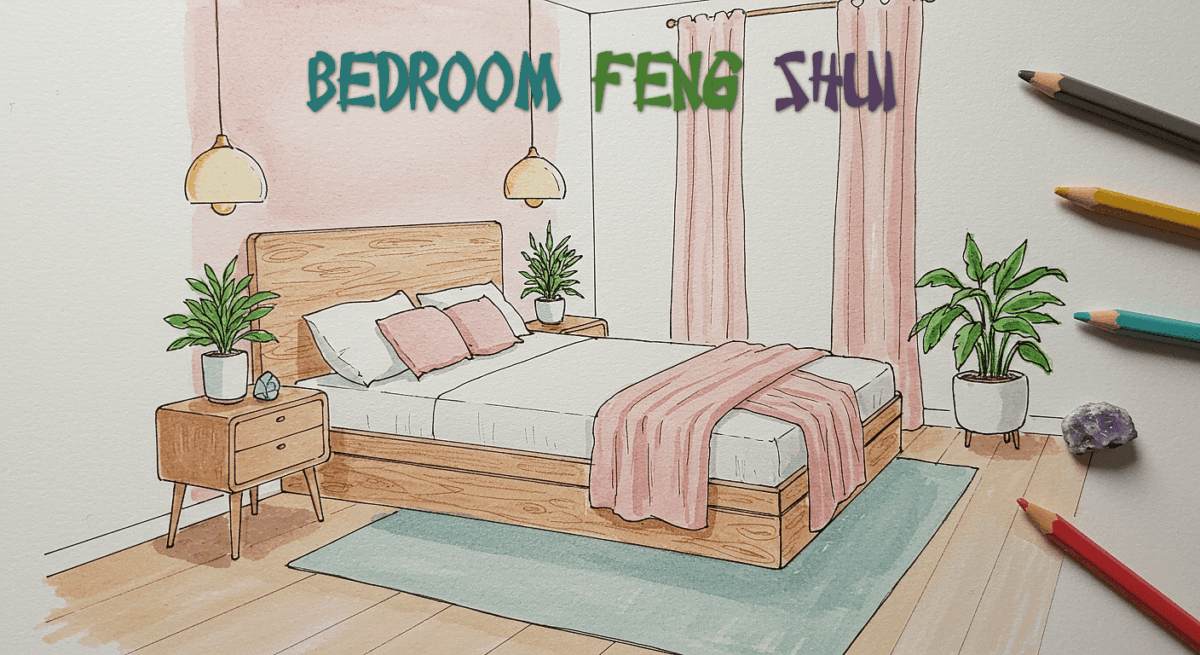Sleep Talk Blog, Health & Wellbeing
Why Your Bedroom Feng Shui Might Be Ruining Your Sleep Quality
Table of Contents
Your bedroom should be your personal sanctuary. A space where you can escape from the stresses of daily life and drift into peaceful sleep. But what if your bedroom feng shui is actually working against you?
You spend nearly a third of your life sleeping, so the environment you create has a huge impact on your rest and wellbeing. Yet many of us unknowingly arrange our bedrooms in ways that disrupt our sleep quality.
Here's what's interesting: spacious, well-organised environments can reduce stress and boost happiness. But a cluttered, chaotic room? That's a recipe for restless nights and morning grogginess. Research shows that clutter can actually increase your stress hormone cortisol, leaving you feeling guilty and overwhelmed.
Whether you're struggling with a small bedroom layout or wondering why you're not sleeping well, the answer might lie in your bedroom feng shui. Poor bed placement, mirror positioning, and energy-disrupting clutter could all be sabotaging your sleep without you realising it.
Don't worry though – you don't need to completely redesign your space. Simple feng shui adjustments can transform your bedroom into the restful retreat you deserve. From mastering the art of bed placement to creating better energy flow, this guide will show you exactly how to turn your bedroom into a sleep sanctuary that actually works.
How Bedroom Feng Shui Affects Your Sleep
The connection between your bedroom layout and sleep quality runs deeper than you might think. Feng shui principles focus on harmonising energy currents called 'Qì' through proper circulation of wind (Feng) and water (Shui). When you sleep, you enter a passive, yin state, making you incredibly sensitive to your surroundings.

Think about it this way: your bedroom layout directly influences how energy flows through your space. Research shows that poor interior arrangements can create uncomfortable zones for sleep. The culprits? Fear of storms, temperature variations, light reflection, noise, and even the psychological impact of feeling vulnerable to intruders.
Bed position matters more than you realise
Place your bed against a window or directly in line with the door, and you've created what experts call a "discomforting zone". Indoor air quality, acoustics, thermal comfort, and your sense of visual command all suffer. The shorter the distance between your bed and the door, the more anxiety you might feel about intruders and external noises.
But it's not just about bed placement. Electronics flood your bedroom with blue light - what feng shui calls yang energy - making it harder to unwind. This active, bright energy works against your body's natural melatonin production.
Even that storage space under your bed could be sabotaging your sleep. During rest, you might subconsciously absorb energy from items stored beneath you. Books, exercise equipment, or anything representing "active energy" can disturb your peace.
Your bedroom's comfort levels - temperature, acoustics, lighting - all interconnect with your furniture arrangement. The way you position your bed and other pieces directly affects these factors, which have significant links to sleeplessness.
Here's something fascinating: whilst research found that feng shui-designed bedrooms were highly preferred by users, they didn't necessarily guarantee better sleep quality. However, many people notice real improvements when they make simple feng shui adjustments.
The key is understanding that your sleep environment affects you whether you believe in ancient energy principles or not.
Common Feng Shui Mistakes That Disrupt Sleep
Most people don't realise their bedroom setup is working against them. These common feng shui mistakes could be the reason you're tossing and turning at night.
The dreaded "coffin position"
The biggest mistake? Placing your bed so your feet point directly towards the door. Feng shui experts call this the "coffin position" for good reason - it allows energy to rush straight at you whilst you sleep, creating restlessness.
Mirrors reflecting your bed
That mirror facing your bed might look stylish, but it's wreaking havoc on your sleep quality. Mirrors reflect and amplify energy, making your bedroom far too active for proper rest. Some people notice immediate sleep improvements just by covering their bedroom mirrors overnight.
Electronics everywhere
Your bedroom shouldn't double as an office or entertainment centre. Electronics emit electromagnetic fields that create an unnatural environment for rest. These devices flood your space with yang (active) energy when you need yin (restful) energy. Plus, the blue light from screens suppresses melatonin production, disrupting your natural sleep-wake cycle.
Clutter under your bed
What's lurking under your bed matters more than you think. Clutter blocks the circulation of qi (life force energy). Since you spend a third of your life sleeping, those items stored beneath affect you subconsciously. Old love letters, work files, or even shoes create active energy that disturbs your rest.
Sharp angles and harsh lighting
Furniture with sharp corners generates tension rather than tranquillity. Sleeping under ceiling beams compresses energy and can cause physical discomfort.
Harsh, bright lights before bedtime keep your space too energetically active. Soft, dimmable lighting creates the calming atmosphere your bedroom needs.
Unbalanced furniture arrangement
Having a nightstand on only one side of your bed creates imbalance and disrupts harmony. Your bedroom needs clear pathways around the bed so energy can flow freely throughout the space.
Recognising these mistakes is the first step towards better sleep. The good news? Most of these issues have simple solutions.
How to Create a Good Bedroom Feng Shui Layout
Ready to turn your bedroom into a sleep sanctuary? Creating the perfect feng shui layout is easier than you might think. You don't need expensive renovations or complete overhauls – just smart positioning and thoughtful choices.
Master your bed placement
Your bed position is the foundation of good bedroom feng shui. Place your bed in the "commanding position" where you can see the door without being directly in line with it. This diagonal placement creates security whilst preventing energy from rushing straight at you during sleep.
Position your headboard against a solid wall – avoid windows which can make you feel vulnerable. Choose a solid wooden or upholstered headboard for stability and support. Most importantly, ensure there's equal space on both sides of your bed. This balanced arrangement promotes harmony and partnership energy.
Choose colours that soothe
The colours you select can make or break your bedroom's restful atmosphere. Embrace soothing earth tones like beige, cream, soft blues, or gentle greens. These calming hues naturally promote relaxation and better sleep quality.

Takeaway Tip: lighter colours make small bedrooms feel larger and more peaceful.
Get your lighting right
Proper lighting can transform your entire sleep experience. Balance natural daylight with soft, warm lighting for evenings. Table lamps, wall sconces, and dimmable fixtures create that perfect relaxing atmosphere. Whatever you do, avoid harsh overhead lighting that keeps your bedroom's energy too active.
Embrace natural materials
Bring earthy energy into your space with wooden furniture, cotton bedding, and other organic elements. These natural materials ground your room's energy and create a more restful environment.
Declutter for better energy flow
Here's your non-negotiable rule: keep your bedroom clutter-free. Remove unnecessary items and avoid storing anything under your bed to allow chi to flow freely. This simple practice significantly improves energy circulation and sleep quality.
Personalise thoughtfully
Add meaningful decorative elements that bring you joy, but remember – less is truly more in feng shui. A few carefully chosen items create more harmony than rooms filled with decorations.
For smaller bedrooms, strategically placed mirrors can enhance natural light, but never position them to reflect your bed. Combined with decluttering, this makes even compact spaces feel open and energetically balanced.
Create Your Perfect Sleep Sanctuary
Sleep quality goes far beyond your mattress choice or pillow fluffiness. Your bedroom feng shui can make or break your nightly rest, and now you know exactly why.
Here's the truth: small changes can make a massive difference. Moving your bed away from that dreaded "coffin position" or simply covering mirrors at night might seem insignificant, but these adjustments can transform your sleep experience overnight.
You don't need to believe in ancient energy principles to benefit from these guidelines. Removing electronics, clearing under-bed clutter, and arranging furniture thoughtfully? These practical steps align perfectly with modern sleep science recommendations.
Whether you're working with a spacious master bedroom or a cosy small space, the same principles apply. Your bedroom represents roughly eight hours of every single day – that's worth getting right, don't you think?
The best part? Good bedroom feng shui doesn't demand expensive renovations or complete room makeovers. Often, it's the simple tweaks that create the most dramatic improvements. Repositioning your bed, swapping harsh lighting for softer alternatives, or choosing calming colours can instantly shift your space from restless to restful.

Why not see our guide here bedroom colour schemes for insipration on calming colours.
Remember, your bedroom should feel like a peaceful retreat that supports your unique sleep needs. Trust your instincts – if something feels off about your current setup, it probably is. Your body knows what it needs for quality rest, and now you have the tools to create exactly that sanctuary you deserve.
Sweet dreams start with smart bedroom choices. Why not make one small change tonight?

